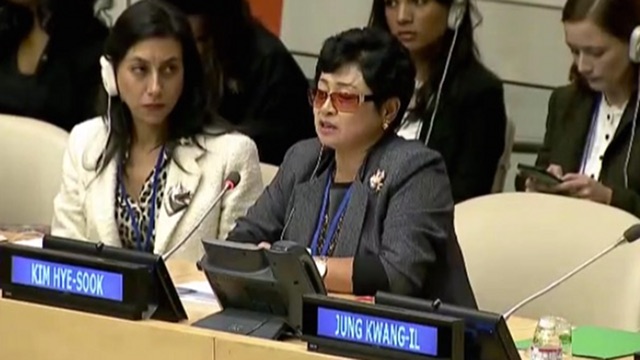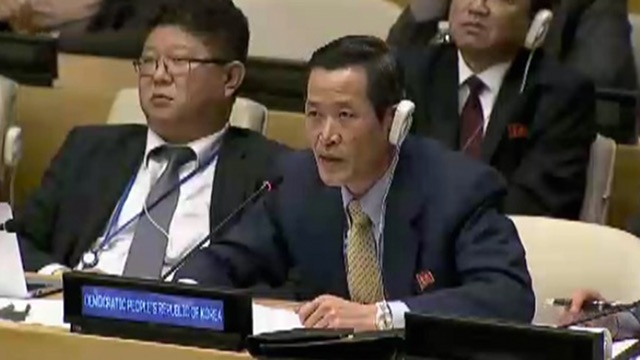SUMMARY
This is AI generated summarization, which may have errors. For context, always refer to the full article.

UNITED NATIONS – “There was no food, no ration at all. There was a woman even killing babies to eat.”
North Korean defector Kim Hye-Sook detailed her experience of suffering in a prison camp for 28 years, and urged the United Nations to recommend prosecuting the reclusive state for crimes against humanity.
Kim and another defector Jung Kwang-Il told the UN how Pyongyang’s prison camp system subjected North Koreans to decades of starvation, hard labor and torture.
“In the winter, all the children didn’t really have shoes or socks or uniforms even. So even children had to suffer all these atrocities,” Kim said at a panel discussion at the UN Headquarters in New York on Wednesday, October 23.
The panel discussion titled “The Human Rights Situation in North Korea” comes as Japan and the European Union (EU) propose a resolution that will demand that the UN Security Council refer North Korea’s human rights abuses to the International Criminal Court (ICC).
The resolution is based on a groundbreaking UN report that documented testimonies from Kim, Jung and other witnesses.
Australia, Botswana, Panama, and human rights groups organized the discussion. In a rare move, representatives of North Korea attended the dialogue and responded.
Kim said that at the age of 13, she was sent to the prison camp where she lost her parents, brother, husband and children because of starvation or accidents.
“For this family of 7 people, there was only 7.5 kilograms of corn given for a month. When we dry them, that’s only 4.5 kilograms. We could barely eat, just one meal a day. We ate grass in the mountain. When you reach the age of 16, you all need to go to coal mines. I also worked in a coal mine for 14 years,” Kim said in Korean.
Jung said he too suffered from starvation so severe that he decided to admit to committing espionage just to get food.
“I was starving so much so I said, ‘If you feed me well, I would confess my crime.’ As a result, I confessed and had a great meal because I was starving. And then I said I wasn’t [guilty] because I wasn’t. After my denial, they beat me up so much,” Jung said.
Eleven years after his release, Jung said he still has scars and nightmares of torture.
Jung and Kim rejected the allegation of North Korean officials that they fabricated their stories and received bribes as part of a US-led conspiracy.
“I heard from North Korea that reality should be reflected in the report. I was a person who lived in a prison camp for 28 years. I drew a map based on memory and I compared that with a satellite image and it was 100% accurate. We don’t need to say anything more,” Kim said.

‘Political confrontation’
Kim Song, Counselor at North Korea’s Mission to the UN, took exception to the testimonies of the two witnesses and to the UN Commission of Inquiry (COI) Report.
Twice, he posed questions to the commission’s chairman, renowned Australian judge Michael Kirby, sparking a lively discussion. Kirby delivered the keynote address at the event. (READ: ‘North Korea rights abuse is world’s moment of truth’)
“These confrontational events have nothing to do with genuine human rights,” the North Korean diplomat said. “Rather, it’s a product of political conspiracy of the US and hostile forces in their attempt to overthrow our political and social system.”
Mr Kim even asked Kirby: “Did you ever read our Constitution and report on human rights?”
Kirby responded that he read every word of North Korea’s “rosy” report on its human rights record, and the provisions of its Constitution.
“Common experience teaches us that in some countries where great crimes are done against people, a Constitution is not as important as the actions of officials who defy the Constitution. Sadly, our world has a number of instances where the Constitution is dead letter,” said Kirby.
Mr Kim again took the floor to say that the COI report had “no legitimacy” because it lacked verification and a “fact-finding process.” He also asked Kirby about media reports that the commission posed leading questions to the witnesses.
Kirby pointed out that North Korea refused to allow him and special rapporteurs into Pyongyang in the first place.
“I spent 34 years as a judge. I know the difference between leading questions and what we call examination in chief, non-leading questions. I asked questions in non-leading form,” Kirby said.
Kirby urged Pyongyang to make the COI report available to North Koreans, who are unable to access the document on North Korea’s tightly closed Intranet.
The judge added, “You suggested the report is the result of hostile forces, purely political. I deny that on behalf of my colleagues. Why should I in my retirement come out to engage in political action versus you?”
‘Morally wrong to stand back’
Canada, the United States, EU and Japan all commended Kirby and the COI report, and vowed to act on the recommendation to refer North Korea to the ICC.
EU’s representative said that like in the past 10 years, the bloc and Japan will present a resolution before the UN General Assembly to draw attention to North Korea’s human rights violations, this time building on the COI report.
“We have been talking to the DPRK (North Korea) in the last weeks and we should say: words must be followed by deeds and we need to see change on the ground,” the EU said.
Botswana said it severed diplomatic ties with North Korea as a result of the report. The country called on UN member states to support the EU-Japan resolution.
“It will be morally wrong if the world stood back and watch events in DPRK take the shape it’s taking. The world must act swiftly to arrest this situation.” – Rappler.com
Rappler multimedia reporter Ayee Macaraig is a 2014 fellow of the Dag Hammarskjöld Fund for Journalists. She is in New York to cover the UN General Assembly, foreign policy, diplomacy, and world events.
Add a comment
How does this make you feel?

There are no comments yet. Add your comment to start the conversation.